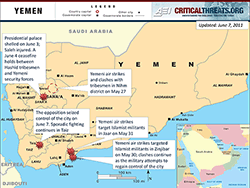 |
The inability to resolve Yemen's political crisis has paralyzed the capital. Outside of Sana’a, the Yemeni military’s failure to regain control of major cities is an indicator of state fragmentation.
Negotiations to resolve the political crisis in Yemen have collapsed. Vice President Abdul Rab Mansour al Hadi, now the acting president, has refused to meet with opposition parties. Defected General Ali Mohsen al Ahmar accused President Ali Abdullah Saleh of harboring al Qaeda in Yemen and said, “I would like to stress that Yemen will be more secure and stable after the departure of Saleh, and will contribute to the security and stability of the whole region.”
Fighting continues in central and south Yemen between government troops and militants. Yemeni tanks and armored vehicles entered Taiz Sunday as part of an effort to regain control of the city from tribesmen. The Yemeni air force has resumed air strikes in Zinjibar, and clashes there killed a colonel and two soldiers Sunday. The Yemeni defense ministry reported that fighting on Saturday killed 21 al Qaeda militants in Lawder and Zinjibar in Abyan governorate. Nineteen soldiers were also killed. Defected General Faisal Ragab commands the battalion combating the militants in Abyan.
The power vacuum created by Saleh’s departure and the continued fighting in Yemen increases the likelihood of state fragmentation. The country also remains at risk of civil war.
If you would like to receive these updates by email, please sign up here.
